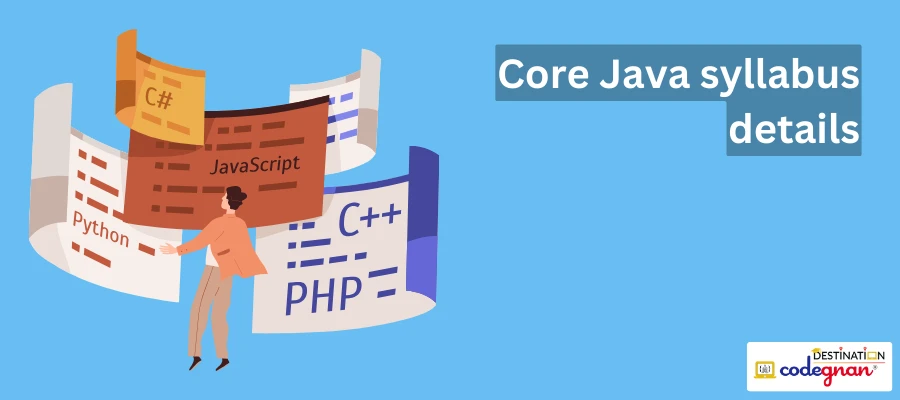Java has been around for a long time, since 1995, and still ranks among the top five most demanded programming languages by recruiters.
Learning Java can be a great skill to acquire if you want to work in the programming or software development domain. In addition, if you have knowledge of other programming languages and are looking to increase your skill set, Java can be a great option.
In a survey of 57,378 software developers globally, it was found that 63.1% of people are using HTML/CSS, SQL, Python, and Java, which makes considering a Java course a thoughtful decision.
But where do we start from? What is the syllabus for core Java? Are we really getting jobs immediately after completing a Java course? You will find all your answers from our guide today!
Complete Java Course Syllabus and Curriculum For 2024
Below, I have listed the overview of the Java course curriculum and subjects. Find the full syllabus details here.
1. Java introduction
Before we start developing Java programs, we need to learn about who invented Java and how the language survived for nearly 27 years, its history and its basic features. This section of the course will introduce you to Java.
- History
- Features
2. Java Basics & Introduction to Eclipse
This section takes you to the post-installation phase of Java and introduces you to the most popular Java IDE, Eclipse. We will also discuss variables and arrays, datatypes, how to create packaged classes, and write your first Java code.
- Post-install configuration
- Compiling and executing
- Variables and arrays
- Create packaged classes
- Writing a simple program
- Data types
- Using Eclipse
- Eclipse shortcuts
3. Operators & Expressions
Operators in Java are the symbols that instruct the machine to perform an activity. These are mainly arithmetic, logical, binary, and boolean. This section clarifies the use of each operator in a statement or an expression.
- Arithmetic operators
- Boolean operators
- Logical operators
- Binary operators
4. Control statements
Java uses decision-making statements and loops to control the execution of codes according to specific conditions. Here, you will learn about branching and iterative statements and understand what loops to use in Java and how they are functionally different.
- Branching statements
- Iterative statements
- Break & Continue with enhancements
- While
- For
- Do..While
- Goto Statement
- Break and Continue statement
5. Java Object Oriented Programming
Java uses classes and objects in its programs, which is known as object-oriented programming. This section of the course will provide you with the basics of OOPs and ensure you understand the difference between class and object. In addition to that, you will learn a few more things that are essential when you are writing Java code, like reference variables, constructors and overloading constructors, member methods and overloading member methods, and so on.
- Basics of OOPs
- Fundamentals of class & object
- New keyword
- Reference variables
- Member methods of a class
- Constructors
- Finalize method
- Overloading member methods
- Overloading contractors
- Passing and returning objects with methods
- Access control
- Static methods
- Static variables
- Static block
- Using final keyword
- Unit testing using Junit-5
6. Inheritance
Java objects can inherit properties from their parent objects, and the concept of inheritance is an essential part of OOPs. If you know the implementation of inheritance in your codes, you can reuse methods from an existing class in your new classes, which is quite interesting. Here, you get a complete idea of inheritance, member accessibility, method overriding, preventing inheritance and some relevant topics.
- Basics of inheritance
- Members accessibility in inheritance
- Using super keyword
- Multilevel inheritance
- The sequence of execution of constructors in inheritance
- Method overriding
- Dynamic method dispatch
- Abstract classes
- Preventing overriding
- Preventing inheritance
7. Exception handling
Exception handling in Java refers to handling runtime errors. Here, you will get to know what exceptions are and their types, as well as the use of try-and-catch keywords. There are a few predefined exceptions in Java, and you will know them in this section.
- Fundamentals of exceptions
- Types of exceptions
- Using try and catch keywords
- Multiple catches
- Nesting of try blocks
- Using throw keyword
- Using throws keyword
- Finally block
- Some predefined exceptions and their usage
- User defined exceptions
8. Interfaces
This part of the core Java course syllabus introduces you to Java interfaces, their purpose in a code, and how to implement them in a program.
- Purpose of interface
- Defining an interface
- Implementing interfaces
- Interface reference variables
- Interface with variables
- Extending interfaces
9. Multithreaded programming
Multithreaded programming refers to the execution of more than one part of a program to maximise the CPU’s memory usage. In this section, you will learn about the basics of threads and their model, defining threads, using multiple threads, and thread synchronisation.
- Basics of threads
- Java threaded model
- Defining threads using Runnable interface
- Defining threads using Thread superclass
- Multiple threads
- Thread Priority values
- Thread Synchronization using synchronized methods
- Thread Synchronization using synchronized blocks
10. Predefined Libraries
Java has multiple predefined libraries, which are basically codes of different classes that someone else wrote and help developers easily transform their ideas into coding. You will get to know some of the popular library classes during the course.
- Using String class
- Using java.lang package
- Working with Data & Time
- Utility framework
- Collection framework
- I/O framework
Hands-on projects included in codegnan’s Java course curriculum
Here are some of the Java projects you will get to complete at Codegnan’s Java training classroom.
- Hello Java world
- Operators playground
- OOPs fundamentals
- Inheritance showcase
- Interface exploration
- Java libraries showcase
Download the Java course curriculum PDF
👉 Download codegnan’s Core Java course syllabus (PDF) for free.
According to the TIOBE Programming Community Index, Java still ranks among the top five popular programming languages. If you are looking to be a part of this domain, now is the best time to give it a try. Codegnan’s core Java course curriculum comprises the basics of Java, predefined libraries, operators in Java, control statements, inheritance, exception handling, interfaces, and more.
What topics come under Java full stack?
Besides covering the core Java syllabus, Java full-stack courses usually cover a few more things.
- Database
- UI Development
- Automation Testing
- DevSecOps
- Spring
- Web services and microservices
Is learning Java easy?
If you have experience with some other programming language, then Java can be easy. Otherwise, for beginners, this can be a little difficult as there are numerous core topics in Java, without which constructing a program is impossible. However, it can be easy if you are doing an online or offline Java course with top instructors and special live interactive classes that Codegnan offers.
Is core Java enough to get a job?
Experts say learning core Java with an industry-accredited certificate is enough to launch a junior developer job. However, you need to have expertise in different aspects of computer science. You can find 1691+ core Java developer jobs across India on LinkedIn.
What is the salary of a Java developer in India?
Java developers in India can make an annual income of ₹1.2LPA to ₹8.1LPA with 1 to 5 years of experience.
| Cities in India | Java Developer salary |
| Hyderabad | ₹1.2 LPA – ₹7.0 LPA |
| Bengaluru | ₹2.2 LPA – ₹8.1 LPA |
| Vijayawada | ₹0.5 LPA – ₹5.2 LPA |
How many months is the full Java course?
The full core Java course in Codegnan is only for one month, and upon successful completion, you will get an industry-accredited certificate. In addition, you get a chance to win HackerRank certification from this platform.
Why enroll in codegnan’s Java training course?
There’s no one reason why anyone can enrol in Codegnan’s Java training course. Firstly, to enrol for our courses, you don’t need to be a professional in programming. But if you are one, doing a core Java course with us can improve your portfolio. What can you get at Codegnan?
- 1-month core Java course
- Course fees are ₹10,000, which is available now for ₹7,999 (limited-time offer)
- Both online and offline classes are available in Vijayawada, Bengaluru, and Hyderabad.
- Course delivered in English.
- Codegnan’s learners are placed in 1250+ companies, including Google, Amazon, Accenture, Deloitte
- 24/7 online support for all students
- Received 4.8 out of 5 from 2180+ students
- We also offer a job acceleration program that offers a 100% job placement guarantee.
Looking for more details about codegnan’s Core Java courses?
- Java training program in Bangalore (1 month)
- Java training in Hyderabad location (1 month)
- Java course in Vijayawada (1 month)
Further resources:

Sairam Uppugundla is the CEO and founder of Codegnan IT Solutions. With a strong background in Computer Science and over 10 years of experience, he is committed to bridging the gap between academia and industry.
Sairam Uppugundla’s expertise spans Python, Software Development, Data Analysis, AWS, Big Data, Machine Learning, Natural Language Processing (NLP) and more.
He previously worked as a Board Of Studies Member at PB Siddhartha College of Arts and Science. With expertise in data science, he was involved in designing the Curriculum for the BSc data Science Branch. Also, he worked as a Data Science consultant for Andhra Pradesh State Skill Development Corporation (APSSDC).












